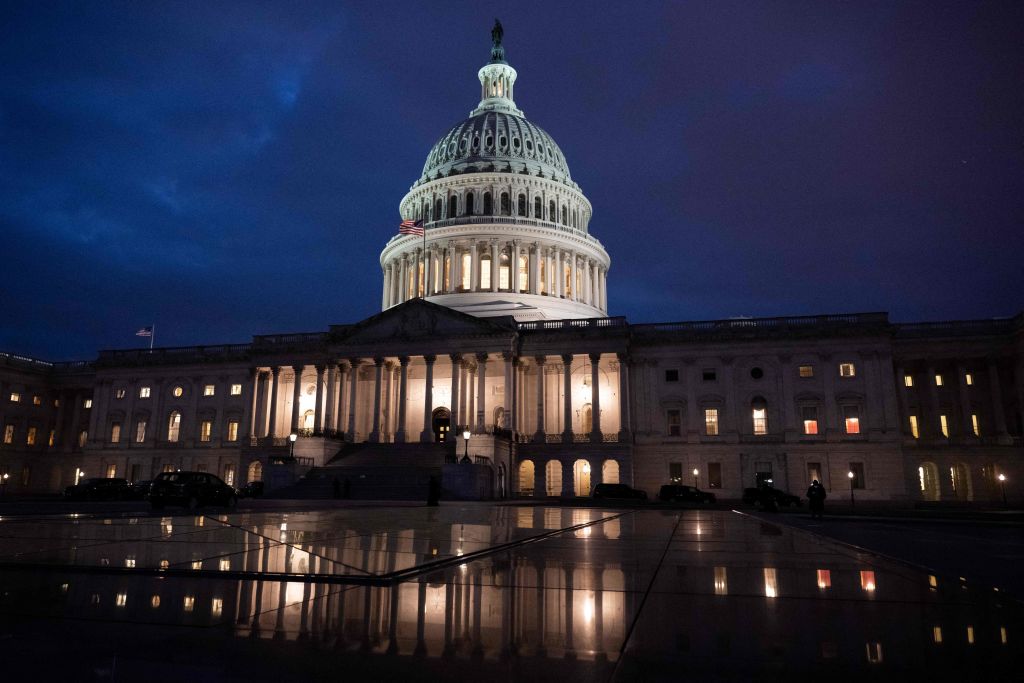On March 29, more than twenty years after the United States commenced Operation Shock and Awe in Baghdad, the Senate made history by repealing the military force authorization that green-lit the operation. The bill, which also aims to kill a previous 1991 authorization for the use of military force, or AUMF, against Iraq during the Gulf War, now heads to the House of Representatives where it faces an uncertain future.
On the face of it, repealing both measures would seem like an ordinary event. Saddam Hussein, after all, has been dead for over sixteen years, hanged by an Iraqi court for a litany of crimes against his own people. His regime dissolved within three weeks of the 2003 invasion. The Iraqi army is now one of Washington’s closest counterterrorism partners in the region. The US doesn’t need these authorities anymore, so why not get rid of them? As the Biden administration wrote on March 16, “Repeal of these authorizations would have no impact on current US military operations and would support this Administration’s commitment to a strong and comprehensive relationship with our Iraqi partners.”
Even so, the current moment is still significant because Congress has been all too willing to defer to the president on matters of war and peace. When President Biden last week authorized precision airstrikes against Iran-linked militias in retaliation for a suicide drone attack against an American base in eastern Syria, not a single lawmaker bothered to inquire about the source of his authority for those strikes. Despite the Constitution placing war-making powers in the hands of the people’s representatives, Congress has run away from even the most cursory discussion on when to introduce or pull out troops from conflict zones. The political fallout from the 2002 Iraq War vote reinforced the notion that it’s more convenient to stay on the sidelines and critique the president instead of getting your hands dirty.
This stick-your-head-in-the-sand approach, however, is no longer politically smart. Surveys over the last several years paint a fairly uniform picture: the American people are frustrated that Congress is missing in action. A 2022 study by the University of Maryland finds that Americans, regardless of party affiliation, want lawmakers to assert their prerogatives by automatically cutting off funding to a president-initiated military operation after 60 days, as stated in the 1973 War Powers Resolution. The Eurasia Group Foundation, a non-profit, found that more than three quarters of Americans believed the president should come to Congress for approval before ordering military action overseas — the exception being if the action is in retaliation for a direct attack against the US. A 2019 poll conducted in five 2020 presidential election swing states revealed that 50 percent of voters supported repealing the 2001 AUMF and evaluating America’s current deployments on a case-by-case basis.
The numbers are clear: Americans want the people they send to Washington to do the work they were elected to do. Some senators, including Tim Kaine and Mike Lee, have devoted a considerable part of their legislative careers to rebalancing the war powers scale between the White House and Congress. But it has taken the institution as a whole far longer to come to the same conclusion. Even today, a significant segment of the legislative branch, including key committee chairman, would rather the president have as much flexibility as possible to determine when the US transitions from peace to war.
Yet the founders of the republic didn’t feel this way. Deciding whether or not to wage war is a national undertaking that deserves a national debate, and such a debate simply can’t occur if the president serves as a de facto monarch. Gifting all the power to the hands of the executive could open up the US to an endless stream of foreign conflicts that aren’t in its interest. As James Madison famously put it in April 1798, “the executive is the branch of power most interested in war and most prone to it.”
Madison was right. Presidents have proven themselves to be more than willing to order military action based on their own conception of what is in the national interest. The examples are nearly endless: Harry Truman in Korea, Richard Nixon in Cambodia, Ronald Reagan in Grenada and George H.W. Bush in Panama (among many others). One of the most brazen cases of overreach in the modern era was the Obama administration’s decision to bomb Libya in 2011, a multi-month mission that was justified on the comical notion that airstrikes don’t constitute an act of war in the traditional sense of the word.
Unfortunately, getting the Congress involved isn’t a fail-safe. Even when lawmakers do authorize force, presidents tend to grossly overextend their authority through expansive interpretations of what those resolutions permit. The 2001 AUMF against al-Qaeda and the Taliban in Afghanistan, for instance, has now been used to justify operations in at least 22 countries, from Libya and Kosovo to the Philippines. The Trump administration used the 2002 Iraq AUMF to justify the killing of Iranian General Qassem Soleimani in January 2020, despite the fact that the war in Iraq had ended nine years earlier.
The lesson is obvious: the executive branch won’t restrain itself. Only Congress can do that. The ongoing AUMF repeal debates are a notable step in the right direction, but the real test will come when future lawmakers are asked to write, debate, and authorize a new military operation. Will those lawmakers succumb to the president’s wishes by serving as rubber stamps? Or will they defend their own constitutional powers by making those AUMFs as restrictive as possible? The former is the prelude to a runaway war and a further gutting of the legislative branch’s relevancy. The latter is an imperfect antidote to inevitable abuse by the executive.

























